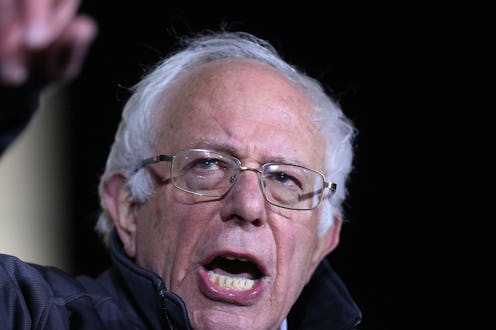News
New Yorkers' Voter Law Complaints Come Too Late
As the state's primary approached, some independent voters, many of whom wanted to feel the Bern, called foul on New York's voting laws. With its closed primaries (which mean you need to be a member of one of the parties to participate) and its incredibly early deadline to switch party affiliation (an independent New Yorker had to register with a party by October of 2015 to vote in the primary), the state's voting registration policies caused many New Yorkers to feel disenfranchised by the whole process. In fact, the issue has boiled over to the point where hundreds of New Yorkers filed a lawsuit to open the primaries on Monday.
While neither Sanders nor his campaign is affiliated with the lawsuit, the Vermont senator has been highly critical of New York's voting registration laws in the lead-up to Tuesday's primary. "We have a system here in New York where independents can’t get involved in the Democratic primary, where young people who have not previously registered and want to register today can't do it," Sanders said at a rally in Manhattan last week. While I believe it's increasingly apparent that parts of the system need to be reassessed and reconsidered, and it's definitely a bummer to see people who are excited about taking part in a political event not able to vote, I also believe it's increasingly difficult to feel sorry for them.
The truth is this: Lasting political change is never won in a single election by a single bright-eyed candidate reaching the oval office. To get that, we need to have voters show up in those less sexy midterm elections. We need them to feel the same fire in our bellies for the people who represent us on local and state levels. The "revolution" that's being sold via platitudes and bumper stickers and that guy you don't talk to anymore from college is nice and all, but it needs to be backed up by a consistent commitment to civic engagement. That is just not there — or it shows up in a too-little-too-late form, like the complaints about New York voting laws days before the primary.
It's an excellent, worthy cause to fight for voter registration reform (and New York's party affiliation policies are admittedly "onerous," to borrow Ivanka Trump's word). But it's a cause that should've been championed well before April or March or even 2016. Folks should absolutely be reaching out to their representatives to express concerns over this, but they should have been doing that a lot sooner. Frankly, it's something that probably should've been championed more aggressively by the Sanders camp months ago (instead of letting it peak as he nears a likely defeat).
When we're talking about primaries, I think it does make sense that it should focus on people who are affiliated with parties. As mentioned, New York's policies for switching affiliation are arguably more stringent than much of the country's rules, and New York has the earliest change-in-party-deadline,. I understand why people want to change these policies. However, because they have been this way for such a long time — and many voters choose to be independents — this very sudden surge of giving a sh*t reads to me as some disingenuous, fair-weather Stanning (that is, rabid fan-lovin') for a favorite politician rather than an earnest commitment to voter accessibility and policy change. Then again, that's a criticism that can be applied liberally to multiple campaigns in this cycle.
Slate's chief political correspondent, Jamelle Bouie, took to Twitter earlier on Tuesday to school some folks on the realities of voter laws. Although some argued that it was restriction of voter rights and even suppression, he perfectly explained why that's incorrect. "One reason I am unsympathetic to self-described 'independents' is because they tend to be reliable partisan voters on either side," Bouie tweeted on Tuesday afternoon, later adding that "It's not a restriction on voting that you can't participate in a primary, sans party ID." Those voters still get to vote in the general elections. They are still being represented.
It's incredibly disappointing to me that we're really good at caring hard in election years, but can't muster that same (or, like, any) energy when it's no longer about the presidency. It doesn't bode well for any lasting political change if we can't commit to that lasting political engagement.
